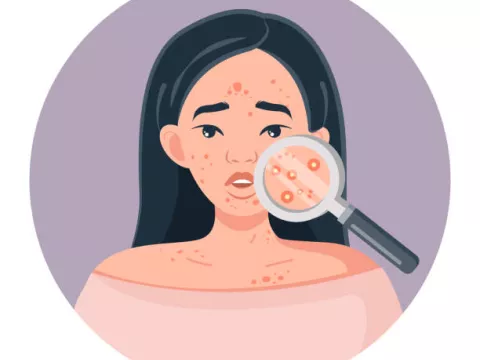- AdventHealth

Choose the health content that’s right for you, and get it delivered right in your inbox.
Acne is a skin condition involving the pilosebaceous unit (which consists of the hair follicle, hair shaft and sebaceous gland). These pores get 'clogged' and the normal skin flora (bacteria) feed on trapped sebum, which can cause the body to mount an inflammatory response leading to localized swelling, redness, and tenderness. This is what attributes to discomfort such as itching and/or pain. Areas affected tend to be the face, back, shoulders and chest.
Acne typically arises in puberty, because it is hormonally driven, but can develop later in life as well. Acne like skin eruptions can also develop secondary to certain medications, working with oils (mechanics), and even from occlusion (blockage which can result from things like wearing face masks, headbands, or helmets). Diet is sometimes reported to affect the course of acne as well, depending on the patient. Acne can be very distressing, leading to squeezing and picking. However, this must be avoided to prevent any further scarring.
Acne may be mild and non-tender, with only white and black heads (pimples), or it can be cystic and painful in nature. The level of treatment varies based on such presentation and can also vary patient to patient depending on what is or is not tolerated. Treatments vary from mild over the counter products and topical prescription medications to systemic medications.
How long acne will persist is difficult to predict. Many patients will 'out-grow' their acne. However, if not managed appropriately, the end result may be a life with resultant acne scars. It is best to see a board-certified dermatologist at the onset of acne to obtain the best course of care possible in this regard.

About Dr. Graham:
Thomas A. Graham, MD, PhD, FAAD is a board-certified Dermatologist with over a decade of experience. His focus is the diagnosis and treatment of inflammatory skin conditions, including but not limited to acne, rosacea, eczema, and psoriasis, as well as providing skin examinations.
with emphasis on investigating the ‘irregular mole’ and any lesions concerning for skin cancer.
Dr. Graham strives to utilize his expertise addressing each patient individually. His desire is for patients to feel heard, given their stories are vital to best treat their skin concerns. Patients may see Dr. Graham by self-referral or referral from other providers. He sees patients of all ages.
To schedule an appointment online visit our website or call Call813-684-5255.
References



